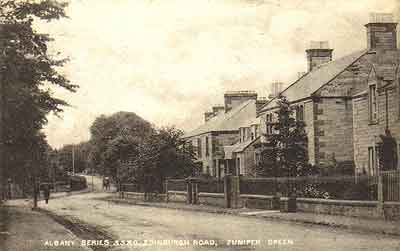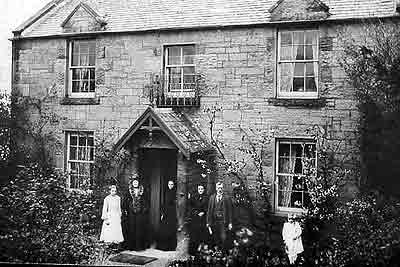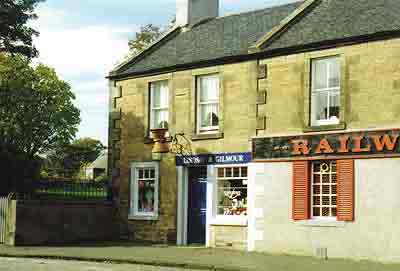Memories of Juniper Green
Memories from a family doctor in Juniper Green after the Second World War...
Dr John Ross gives some thoughts on the privilege of being a family doctor in Juniper Green in a couple of interviews with Cliff Beevers on Wednesdays 8th/22nd November 2006.
I became a doctor in 1937. It was when I was house surgeon at the Royal Infirmary in Edinburgh in 1939 that I met my dear wife Rosamund who was a senior medical student at the time. Rosamund was a popular young woman, keen on all games, captain of the University hockey team, played tennis for the University and a long jumper of some renown. She put up the Scottish flag at the Monaco European International games sometime in the 1930s, but she didn't jump too far away from me! The first thing she said to me was "Do you play golf?" Her father, Dr Thomas Sellar MC, had won a Military Cross in the Great War. He was the doctor in Juniper Green and after the war years I joined him in practice in 1946.
We weren't called GPs but family doctors.
Most practices were either single-handed or in partnerships of two, there were no group practices. People identified themselves with one doctor, their doctor, from whom they sought help and advice. There were only two doctors in the area: Dr Maitland Moir in Currie and Dr Sellar in Juniper Green. They looked after the two practices for holidays and in emergencies.
A delivery, a drink and a pan drop!
Most babies were born at home with the help of a midwife. It seemed the natural place for a baby to be born and a mother never forgot the doctor who brought her baby into the world. Only abnormal or difficult pregnancies were referred to hospital. Most of the medical care took place in the patient's home. I visited patients every day including Christmas Day and New Year's Day when necessary. You might well be offered a drink on these occasions along with a pan drop! The doctor was held in great respect and had many opportunities to do good and help patients overcome their illnesses. I particularly liked to visit patients who went into hospital. I found it rewarding as they were always so pleased to see you.
We used to see patients at the Bield when Dr Sellar was alive and then we moved down to Southernwood. I was single handed for years. Then, one day I was visiting a Juniper Green patient in Chalmers Hospital and the patient told me about a very good doctor called Dr Sneddon, and that's how I came to meet him. I talked to him and that was the start of the relationship we had, probably in the early 1970s. We joined up with Dr Moir's practice and Dr Gordon was in that practice. Now, there isn't the same personal involvement with the patients, it loses its personal side. In the olden days people realised that they had to look after themselves to some extent. In those days a lot of people got through their minor illnesses on their own.
Diseases
TB was still about when I started but there was very little you could do about it, fresh air was the remedy. There were special clinics which people had to attend. Bovine TB was contracted by milk from infected cows, that was common. It produced large glands in the neck, I had them myself when I was little. There wasn't the same control over milk as there is today nor were there anti-biotics. The pulmonary or chest TB, however was dangerous. Openly infectious cases had to be isolated in sanitoria. Half the city hospitals were taken up with pulmonary TB and there was the Royal Victoria and other sanatoria around the city full of cases of it.
In 1936 397 people in Scotland died of diphtheria: that was something else you couldn't do much about. People with diphtheria were isolated in the fever hospital in Colinton. I doubt if any doctor today in the UK has seen a case of diphtheria. The common children's diseases of measles and scarlet fever were around of course too. Scarlet fever was another killer in my early days and septicemia was always a dreaded complication of infection. I remember a girl of seventeen coming into hospital and dying of septicemia and it all started after a tooth extraction.
Diseases like measles just ran their course. People got better, Nature tends to mend and not to end. It tries to get you better.
The school had their own school doctors, I don't recall being particularly involved with the schools. We didn't have a nurse in the practice, they didn't come under our jurisdiction at all, they were part of the Council. They would visit and hold school clinics. They were under the Public Health Board.
Juniper Green is unique!
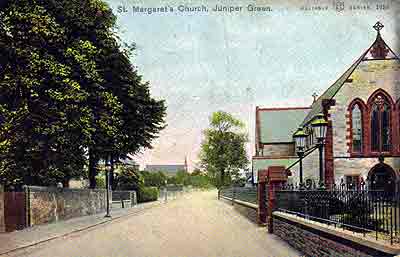
St Margaret's Church where Dr John Ross and his bride Rosamund Sellar were married in 1940
Rosamund and I were married in the beautiful church of St Margaret's in Juniper Green in 1940 where Jimmy Bailey was the organist and a much loved figure. He was waiting to play "Here comes the bride" when Rosamund appeared and took such a leap up the aisle dragging her father after her so he was only able to play two bars.
Juniper Green was a very remarkable place full of remarkable people and a village with its own identity. When my troopship reached Cape Town during the Second World War I sent a cable to Rosamund and the postmaster was intrigued with the name Juniper Green. He looked in a big book and told me "There's only one Juniper Green in the world and it is a postal address" so my cable could have gone to "The Bield, Juniper Green".
We had our village queen and the annual fete and one year I was asked to open it. I told the assembly my story and the remarks were later printed in the Evening News with a footnote from the editor which read "Phillip's gazetteer corroborates this statement". Now, alas, we are just a district of Edinburgh, EH14; St Margaret's Church has been demolished and replaced by flats.
The clergy
I knew Dr Stewart from Currie, he was a highly-regarded person. He went about in a Norfolk coat. If I saw him as I was going up the road I would give him a lift. I remember one day as he got out of the car he spotted a lady with a plaster on her leg and he said to me" I wonder who she is and what she has done." I said "Oh, that's Mrs Jackson, she's broken her leg, she is one of my patients." As I drove away I heard him shout to the lady "Hello Mrs Jackson I hope your broken leg will soon be mended." But I don't think he knew her at all.
Dr Stewart was always ready to tell a story. One Sunday he was asked to preach at St Stephen's Church. On his way he spotted an old lady climbing the steps to go into the church and he offered to help her. When they were nearly at the top she asked him who is preaching here today. He replied "I believe it is a Dr Stewart of Currie". The old lady stopped in her tracks and said "Dr Stewart you say ... of Currie... hmmm... will you help me doon again?"
The other doctors
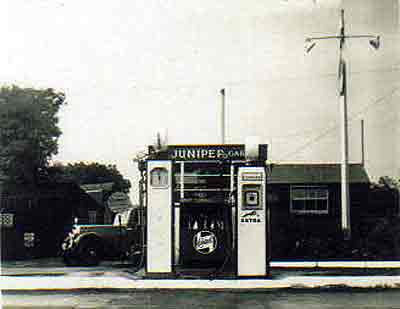
Perhaps Dr Maitland Moir of Currie would have used the pumps at Bryce's petrol station on Lanark Road
Talking of Currie one thinks of that famous figure Dr Maitland Moir. He said what he thought and there was no nonsense with him. He was not the finest of motor drivers, sort of slap dash, but it annoyed him intensely when he reached a certain age and he was told by the authorities that he would need a medical certificate in order to continue driving. He came stomping down to me with a certificate which said "I have today examined Dr Maitland Moir and consider him medically fit to drive a motor vehicle" together with a command "Sign that". What could I do? I just prayed.
Dr Moir was a very keen fisherman too and all his holidays were spent fishing. Once when he was up in the North West Ross-shire he caught a fine sea trout and thought that this would make a fine present for Dr Sellar. So he parcelled it up and sent it on its way little knowing that the postal arrangements in the Highlands in those days was something unique to themselves. The magnificent gift took a fortnight to reach the Bield and Peter Kedzlie, the postman, as he handed it in said "I hope you will now give it an honest burial".
Characters in the village
Well, there was Bob Fordyce, with his brother James, won international renown for his bowling. He worked as a gardener. He was very well known in the village.
Ian Orr, a laddie at Heriots, played rugby for Scotland and later became our esteemed Chief Constable, Sir John.
One day when I was consulting I had a very busy evening and I had a slight cold. That dear old soul Miss Gibling was in seeing me. She noticed that I had a cold and she said "It looks to me as if you need a doctor". I told her "Miss Gibling, I'm the only one in Juniper Green who hasn't got a doctor" Late that night when I was shutting the big door I noticed a brown parcel containing onions and a recipe of what to do with them. What was so delightful was that she had left the message - "We are none of us left unprovided for in this world". She was a great character.
I could tell you many stories of the wonderful people of Juniper Green in these days. There was the old lady who I had always known as living on her own. Writing a prescription for her one day I couldn't remember if she was a spinster or a widow so I asked "Are you Miss or Mrs?" And, she said "I am Miss but I haven't been entirely neglected!" She had probably received a Valentine card before the turn of the nineteenth century!
Folk are much more interesting than their diseases.
Great advances have been made in our understanding of disease and how it should be treated but patients are always more important and more interesting than the diseases they have. The aim of the family doctor is to improve the quality of life. With all the advances, if this only means that life is prolonged just to spend the later years in a nursing home with dementia, what is the advantage? Death comes to us all whether the life is long or short, what is important is that we should find it all worthwhile and that the family doctor has helped us along the way.
Welcome.....even if they are still in their curlers!
I have many happy memories and it has been a great privilege to have been the doctor in Juniper Green for so many years especially in the old days when you had time to speak to people and get to know them and all about them, sharing in their joys and sorrows. A doctor's life has always been busy but to win the trust and faith of ordinary folk lightened the load. To be a family doctor is the finest job in the world. A family doctor is a very lucky man because the people want to like him and if he is decent at all then they will love him and he has great opportunities to help them far beyond the giving of a bottle of medicine. He is the only man who can knock on the door and walk in and be welcomed even if they are still in their curlers. There is no greater joy than knowing that you are needed and helping people. There is often something said that is memorable.


